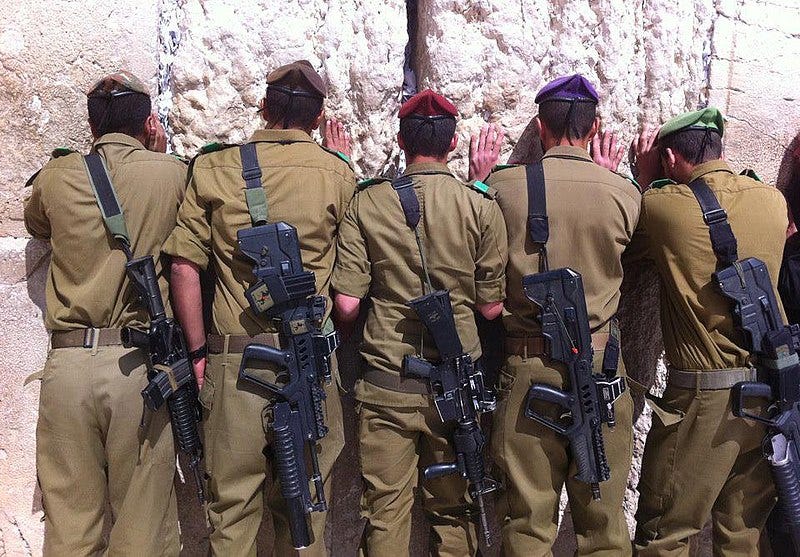
Hamas must be utterly destroyed. The gleeful brutality of Saturday’s attack, and the gleeful way in which the perpetrators documented and disseminated their atrocities, laid bare the very face of evil. Murder of unarmed civilians, raped women dragged through the streets, babies killed, others torn from the wombs of their mothers and left to die; this horror is no different from the Islamic State’s rampage in Sinjar. Hamas deserves exactly the same treatment ISIS received. A ground operation into Gaza (and perhaps a re-occupation) is not just a strategic imperative but a moral necessity.
But that necessary task is very difficult. Below are a few general strategic considerations on the war that’s only now beginning.
1. Ground operation in Gaza
Ground operations in Gaza are difficult because it’s so densely populated—2 million people in 141 square miles. And urban combat tends to produce very high casualties, even for a military as skilled as Israel’s, especially when the defender has nowhere to go. One way to minimize those casualties, of course, is through heavy use of airpower. That’s how the US-led coalition managed to defeat ISIS in Manbij, Raqqa, and Mosul, with local ground forces that sometimes possessed very little training or urban combat capabilities (especially in Syria). But airpower, even accurate Western airpower, has the side effect of producing a lot of civilian casualties.
That demonstrates another problem: how best to minimize civilian casualties. It’s a thankless task—the usual suspects will condemn Israel anyway. But Israel is not Hamas: that’s the whole point. Israel ought to stand for what is right. That requires an attempt to abide by the laws of war. Basically, it’s hard for me to see how this operation works without some means for civilians to flee Gaza. That has strategic benefits, too: it will deprive Hamas of local support, lower the use of human shields, and allow the IDF to proceed with more force and less precision (thus increasing operation tempo and reducing its own casualties). (See the final section of this US Army report on lessons from the Battle of Mosul.)
Ideally, Egypt would partially reopen the Rafah crossing, but Egypt doesn’t want to risk an influx of terrorists any more than Israel does, since Hamas will certainly try to hijack any kind of civilian corridor. Consequently, Egypt has been pushing Israel to take them instead. Perhaps the United States could assist in providing security either for evacuations or refugee camps, given our experience screening for ISIS members amid fleeing civilians in the latter parts of the Syrian anti-ISIS campaign, and later at the al-Hawl camp in Northern Syria. That might assuage Egyptian fears, or else allow Israel to evacuate some civilians into its own territory without having to dedicate additional troops to the endeavor. (Note that President Biden is already attempting to coordinate such an effort).
2. Hezbollah & Iran
It’s really hard to tell how much Hezbollah and Iran knew about this attack, but I think gradually mounting evidence suggests less coordination than one might expect. Hezbollah shows no real signs of engaging; clashes in the north thus far appear to involve members of the Palestinian Islamic Jihad. Given Lebanon’s terrible state, it’s hard to see how Hezbollah would benefit, and it tends to be more cautious and less suicidal than Hamas anyway. Iran, too, has little reason to get involved directly. Why take any risks when someone else has already done your job for you? (Especially at a moment when the US is willing to release $6 billion in frozen assets and generally looks squishy.) I’m sure Hamas hopes Hezbollah will open a second front and hopes for direct Iranian support, but that doesn’t mean it will come. For now, I tend to think a wider war is unlikely.
That said, the US should absolutely be prepared to take direct military action in case of action from either Hezbollah or Iran, and the US has already communicated threats to that effect to Hezbollah. The WSJ now reports that the US may retain two carrier strike groups in the Eastern Mediterranean once the Eisenhower arrives in the area.
3. Israeli intelligence failure/internal ramifications
It turns out there was advance warning—from Egypt. Only it was not “specific or focused” and never reached Netanyahu. See this new report. It’s worth considering what sort of long-term internal repercussions the attack will have in Israel, and it wouldn’t be surprising if Netanyahu pays a grave political price when the war ends.
4. Future of Gaza
Netanyahu never really had a strategic plan to solve the Palestinian question; it took a back seat to his domestic political priorities. It’s clear now, if it wasn’t already, that the problem will not resolve itself. I have no idea what the solution is, but a post-war arrangement will need to eliminate any possibility of Islamist control over the strip while simultaneously providing the level of economic opportunity necessary to minimize Palestinian unrest.
I would not be surprised if renewed Israeli occupation is the only choice, but this might be another opportunity for intensified Western activity—perhaps even military support in the form of peacekeeping troops. Who knows? The future, unfortunately, is bleak.
Jonathan Meilaender is a JD candidate at Harvard Law and is concurrently engaged in a Master’s program in German and European studies at Georgetown University. He received his BA in Politics from Saint Vincent College where he was also Editor-in-Chief of the Saint Vincent College Review. @JMeilaender



